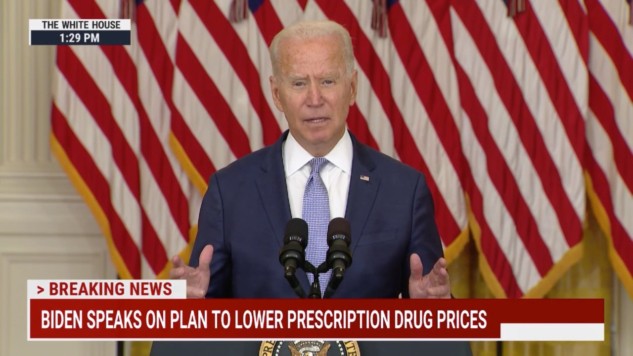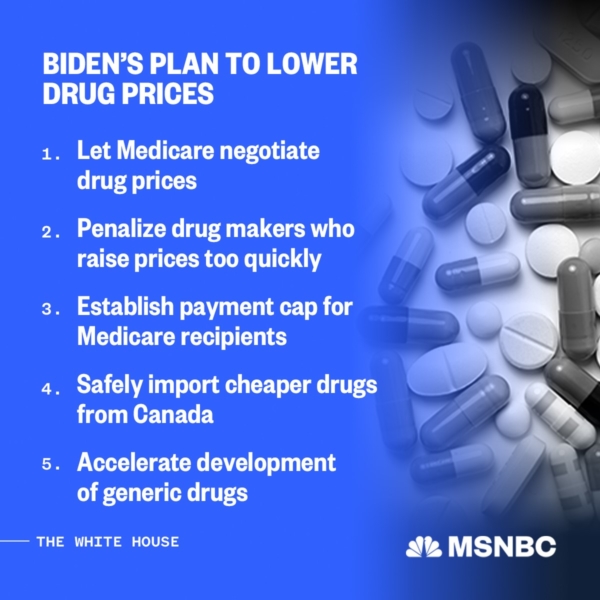Big Pharma Dreads Medicare Price Negotiation

Big Pharma is none too happy with legislation to allow Medicare to negotiate drug prices, according to published accounts and members of the advocacy community. Such opposition is nothing new, of course, but it has intensified as the Democrats’ (and the President’s) drug reform plans work their way through Congress as part of the budget reconciliation process.
Of course, the drug industry fears that allowing Medicare to negotiate drug prices would cut into its sizeable profits.
“Big Pharma — one of the most profitable industries in America — is absolutely horrified at the idea that its ability to extract all those trillions of dollars might be limited.” – Washington Post, 8/27/21
Currently, Big Pharma can set prices at will – no matter how outrageous or unaffordable. (Simply look at the skyrocketing price of insulin, for example.) Medicare negotiation would force the industry to the bargaining table with the federal government – saving some $456 billion in drug costs over ten years. But price negotiation was specifically excluded from legislation creating the Medicare Part D Prescription drug benefit in 2003, at the industry’s behest.
Meanwhile, overwhelming majorities of Americans from both parties support this commonsense proposal in poll after poll. But Big Pharma is running an expensive ad campaign to scare the public. One television ad warns about “Pelosi’s socialist drug plan.” Another features a senior with diabetes named “Sue” who claims that price negotiation “would make it harder for people on Medicare to get the medicines we need.” No, actually, it’s the high cost of insulin and other essential drugs that make it harder for people on Medicare to get the medicines they need. Too many beneficiaries simply can’t afford their medications — and cut pills in half or skip filling prescriptions altogether.
The pharmaceutical lobby warns that “Washington (would) control the prescription drug market” through price negotiation. If that were true, then the Veterans Administration would already be controlling the market, because it has been negotiating drug prices with Big Pharma for years. The federal government constantly negotiates prices for private sector services and products. It’s part of the free-market system that conservatives tout. Does that mean Washington ‘controls’ the market for everything from concrete to aircraft? Obviously not. In fact, we are the only Western industrialized democracy that does not negotiate prescription drug prices with manufacturers – or have an agreed upon pricing structure.
“American drug purchasers pay substantially higher prices for drugs than their counterparts in other developed countries. A recent paper from the RAND Corporation cited in the government proposal estimates that prescription drugs in the United States cost more than 250 percent of the prices paid by other countries.” – New York Times, 9/9/21
Big Pharma insists that price negotiation would stifle innovation in the pharmaceutical market, even though the federal government puts significant resources into research on new drugs. (In fact, the federal government was instrumental in developing the mRNA technology used in the Moderna and Pfizer vaccines.)
“A study underwritten by the National Biomedical Research Foundation, mapped the relationship between NIH-funded research and every new drug approved by the FDA between 2010 and 2016. The authors found that each of the 210 medicines approved for market came out of research supported by the NIH. Of the $100 billion it spent nationally during this period, more than half of it — $64 billion — ended up helping the development of 84 first-in-class drugs.” – Other98.com
Medicare price negotiation is one facet of the Democrats’ proposed drug reforms, along with lower out-of-pocket caps for beneficiaries and tying the increase of prices to inflation. Advocates consider negotiation the most potent tool for bringing down seniors’ drug costs. But the measure must survive the reconciliation process in the Senate, where the Democrats need fifty votes to enact reform. Seventy-two U.S. Senators received contributions from Big Pharma in the last election cycle. That is not to say that some Senators won’t do the right thing, but the sway of drug industry dollars can be powerful.
In the end, lawmakers’ priority should be the people on fixed incomes who can’t afford their medications, the Americans who have died from rationing medicines, the retirees forced to choose between groceries and prescription drugs because of cost. They are the ones who badly need relief. Drug manufacturers will be perfectly fine — even if the price negotiation they dread is finally enacted.
Social Security Trustees Report Signals Now is the Time to Strengthen & Expand the Program



Americans who rely on Social Security can exhale for a moment now that the program’s Trustees have reported that the trust fund will remain solvent until 2034. That’s only one year earlier than projected in last year’s report.
“There is no need to sound the alarm, but now is the time to address Social Security’s long-term solvency – and provide an overdue boost in benefits. Phone calls and emails to Congress are definitely warranted at this critical juncture.” – Max Richtman, President and CEO of the National Committee to Preserve Social Security and Medicare.
The program, which has never missed a benefit payment in its 86-year history, remains strong. If Congress does not take curative action and the trust fund becomes depleted, Social Security still could pay 78% of benefits because of the steady inflow of revenue from workers’ payroll contributions. But that poses a huge financial risk for the millions of retirees who depend on Social Security for most if not all of their income. It also raises a serious political risk for members of Congress who fail to boost the program’s finances so that the trust fund remains solvent beyond 2034.
At the same time, benefit adequacy needs to be addressed. Living on an average monthly benefit of $1,540 is tough. Retirement savings are dwindling, pensions are disappearing, and the cost of senior housing and medical care are soaring. For over six years, Congressman John Larson has been driving efforts to strengthen Social Security by adjusting the payroll wage cap so that high income earners begin paying their fair share.
Rep. Larson has also proposed an across-the-board boost for all retirees, enhanced benefits for the most vulnerable seniors, and a more accurate formula for calculating annual cost-of-living adjustments (COLAs) so that benefits truly keep pace with inflation. Rep. Larson’s proposals align with President Biden’s own prescriptions for improving Social Security. These proposals win approval from a majority of Americans in poll after poll.
“Of course, the default response from conservatives will be to suggest, indirectly or otherwise, that Social Security benefits must be cut to address the program’s funding shortfall. Some will insist that Social Security be privatized, which would gamble workers’ hard-earned retirement benefits on Wall Street. Meanwhile, conservatives likely will oppose common sense revenue-side measures that would actually boost benefits, including Rep. Larson’s proposed adjustment of the payroll wage cap.” – Max Richtman
The depletion of the trust fund in 2034 is not a foregone conclusion. With Democrats in control of the House and Senate — and an advocate for Social Security in the White House — advancing legislation to strengthen and expand the program is finally within reach. But the public must demand that Congress muster the political will to get it done. The Trustees Report is a firm reminder that time is running short.
The House-passed Budget Resolution Holds Historic Promise for Seniors



Wikimedia Commons
The Mainstream Media seemed to relish the conflict between House Speaker Pelosi and moderate Democrats over the President’s $3.5 trillion “human infrastructure” spending plan. A CNN opinion piece screamed, How the Mess in Congress Shows why Democrats are Right to be Freaking Out, while a headline in Politico read, Mutually Assured Destruction. Of course, Democracy is a messy process and Democratic party politics is even messier. But in the end, the budget resolution passed the House on Tuesday after leadership reached an agreeent with moderate Democrats to vote on a separate, bipartisan infrastructure package on September 27th.
“The agreement reached will kick off a flurry of activity over the next several weeks as top House Democrats work with their Senate counterparts to privately craft a spending bill that can pass both chambers.” – Politico, 8/24/21
Lost in much of the coverage is the actual intent of the budget resolution – to lift-up vulnerable Americans during very trying times, especially the nation’s seniors.
President Biden praised Congress’ progress on his “Build Back Better” agenda Tuesday afternoon, saying the country is a “step closer to truly investing in the American people.” – CBS News, 8/24/21
The passage of the resolution by the House sets up a budget reconciliation process where the President’s (and most Congressional Democrats’) priorities can move forward, even if Republicans refuse to support them. Once the reconciliation process is over sometime this fall, seniors are likely to see historic expansions in the social safety net that protects them.
“Passing this rule paves the way for the Building Back Better plan, which will forge legislative progress unseen in 50 years, that will stand for generations alongside the New Deal and the Great Society.” – House Speaker Nancy Pelosi, 8/24/21
The Biden/Democratic plan includes adding dental, vision, and hearing coverage to traditional Medicare. This expanded coverage is crucial to seniors’ overall health, since the absence of proper dental, vision, and hearing care can increase the risk of grave medical consequences – from dementia to disabling injuries. Seniors have not seen their Medicare benefits expanded since 2003 with the passage of the significant, but flawed Part D prescription drug program.
The budget legislation will aim to correct the main shortcoming in Medicare Part D by allowing the program to negotiate drug prices directly with Big Pharma. This will save beneficiaries an estimated $102 billion over ten years. The National Committee has fought hard for this goal, as it is one of the most effective methods to bring down prescription prices not only for seniors – but for all Americans.
Similarly historic would be the allocation of billions of new federal Medicaid dollars for Home and Community Based Services (HCBS), which allow seniors to receive long-term care outside of institutional settings. Research has shown that older people have better health outcomes when they can remain in their homes and communities. Meanwhile, the pandemic has only highlighted the risks of putting seniors into nursing homes.
Now that the budget resolution has passed, the committees of jurisdiction in the House and Senate can begin drafting actual reconciliation legislation with specific dollar figures attached to each initiative. That process is expected to begin in September, with a vote on the package sometime this fall. There are no guarantees here. NCPSSM Director of Government Relations and Policy Dan Adcock says that negotiators will try to cleave to the President’s priorities, but will likely have to compromise on some items in order to win enough votes within the Democratic caucuses in both houses.
Some of the moderates who rebelled against Speaker Pelosi’s plan to move forward on the budget resolution have expressed skepticism about the $3.5 trillion price tag and may try to reduce it. So have Sens. Joe Manchin (D-WV) and Krysten Sinema (D-AZ), whose votes are crucial to the passage of a reconciliation bill in the Senate.
If the overall amount of the spending plan is reduced, some of the party’s (and the President’s) priorities may be squeezed. Adcock says that the President’s proposal to spend an additional $400 billion on HCBS, for instance, will probably be lowered to something approximating $150 billion instead. A compromise on Medicare expansion may involve more modest dental, vision and hearing coverage – or the addition of one of those (most likely dental) coverages at the expense of the others. “We’re looking at the most we can get (for seniors) given the current political circumstances,” says Adcock, noting that Democrats have the slimmest of margins in the House and Senate.
Amid the uncertainty and likely compromises, though, it’s important to keep in mind that progress on any of these priorities would be historic. This is the first time in 12 years that both President and the majority party in Congress are committed to a long-overdue widening of America’s social safety net. In the wake of a Great Recession, growing wealth inequality, soaring health care and prescription prices, and a devastating pandemic, Americans of all ages should rightly expect to see these expansions finally become law.
Happy 86th Anniversary to Social Security
Originally published in Common Dreams
One of our nation’s most popular federal programs marks another year of success on August 14th. Social Security—the income security program for workers, retirees, people with disabilities, and their families – was signed into law by President Franklin D. Roosevelt 86 years ago. But it’s been almost four decades since the program was last reformed. In 1983, Congress took action to shore up Social Security’s finances under the acute threat of insolvency. Fast-forward to the present. We are confronted with a looming shortfall in the program’s finances amid a growing demand to boost benefits. But bi-partisan action to strengthen Social Security has been elusive—despite the best efforts of some lawmakers to put forward solid proposals.
Here is what we are facing: The 2020 Social Security Trustees report projected that the program’s trust fund will run dry in 2034. (The 2021 report is overdue.) At that point, Social Security could still pay 76% of benefits. But seniors cannot afford a 24% cut. In fact, they cannot withstand any cuts—especially when their benefits are already so modest.
Most beneficiaries rely on Social Security for the majority of their income, meaning millions of seniors live ‘hand to mouth.’ Try living on today’s average benefit of $1,543 per month. That’s $18,500 in annual income, which is only about six thousand dollars above the federal poverty level for individuals. For women and people of color, the numbers are even lower: $16,500 and $14,800, respectively.
Retirees shouldn’t have to skim so close to the poverty line after contributing to Social Security for most of their lives. Let’s remember that the reason President Franklin Roosevelt created Social Security in 1935 was to keep seniors out of the ‘poor house.’ (It wasn’t just a figure of speech. Millions of older Americans were, in fact, dwelling in poor houses across the country before Social Security was enacted.)
Eighty-six years later, the benefits are no longer adequate. Social Security cost-of-living adjustments (COLAs) are failing to keep pace with seniors’ living expenses from year to year. While next year’s COLA is projected to be higher than in the recent past (because of pandemic-related inflation), previous COLAs have been relatively paltry—even dropping to zero three times since 2010. This is largely because COLAs are calculated based on the Consumer Price Index for Wage Earners and Clerical Workers (CPI-W), which doesn’t reflect seniors’ spending priorities.
If anything, seniors will need more accurate COLAs and higher benefits to survive financially in the mid-21st century. Middle-class income—which has been all but stagnant for decades—is expected to remain flat through 2030, according to a Kaiser Family Foundation estimate. At the same time, seniors’ expenses will continue to rise, especially in the areas of health care and housing. Kaiser projects that Medicare beneficiaries’ out of pocket medical costs could consume half of their average Social Security income by 2030. A Harvard study found that the number of senior households burdened by housing costs will increase 37% by 2035 (the same year that older Americans will face that 24% benefit cut if Congress doesn’t act to strengthen Social Security).
With retirement savings declining and employer-provided pensions disappearing, tomorrow’s seniors will rely even more on Social Security to make ends meet. That’s why the program must be expanded and strengthened. Despite the ongoing media narrative that “no one in Congress wants to touch” Social Security, there are earnest efforts on Capitol Hill to fortify the program’s finances and increase benefits.
Rep. John Larson (D-CT), Chairman of the House Ways and Means Social Security subcommittee, will soon introduce a bill based on his earlier legislation, the Social Security 2100 Act. It’s expected to to align with President Biden’s proposals for strengthening and expanding Social Security.
The Social Security 2100 Act included an across-the-board increase for all beneficiaries, along with targeted increases for the most vulnerable—including widows, widowers, and low-income retirees. It also called for the adoption of a more accurate formula for calculating COLAs, known as the CPI-E (Consumer Price Index for the Elderly). The CPI-E is much fairer and more accurate for seniors than the CPI-W because it better reflects what seniors spend most of their income on—especially health care.
Along with these proposals, we hope President Biden’s support for family caregiver credits will be included in the new bill. Caregiver credits bolster workers’ retirement benefits so they are not penalized for taking a break from paid work to care for loved ones.
How would all of this be paid for? By asking the wealthy to contribute their fair share in Social Security payroll taxes. Right now, payroll wage contributions are capped at $142,800. Growing income inequality over the past four decades has decreased the percentage of overall wages subject to Social Security payroll taxes. The cap should be adjusted so that high-earners make payroll contributions on wages exceeding $400K per year, honoring President Biden’s pledge not to raise taxes on anyone earning less. This new revenue would extend the solvency of the Social Security trust fund beyond its projected depletion date.
Unfortunately, there are some in Congress who want to cut Social Security benefits in the name of fiscal austerity. Many conservatives claim that the program must be slashed in order to reduce the national deficit, even though the program is self-funded and doesn’t contribute to federal red ink. These calls increased after the deficit-swelling Trump tax cuts for the wealthy and big corporations blew a $1.5 trillion hole in the federal budget.
Now, some ‘fiscal hawks’ are proposing the creation of special Congressional commissions to decide the fate of Social Security, whose recommendations would bypass the traditional legislative process and be fast-tracked to a floor vote. The program could be cut without seniors and their advocates having so much as a seat at the table.
Conservatives are also pushing to raise the Social Security retirement age. (Congress already enacted a phased-in increase from age 65 to 67 as part of the 1983 reforms.) Now, proposals are being floated to increase the age again to 69 or 70. This would be a massive benefit cut, and assumes that all workers—regardless of health status or profession—can work that long. The truth is, millions can’t, and will be severely impacted if their benefits are slashed.
Opponents of benefit expansion insist that younger adults shouldn’t ‘support’ today’s seniors, even though Social Security has worked extremely well as an intergenerational compact since 1935. In fact, the younger generations will also retire someday. And if current socioeconomic trends continue, they will need every penny of their Social Security benefits—and more. Many will also need Social Security’s disability and survivor’s benefits long before they retire.
As Rep. Larson points out, while Congress made changes to the program in 1983, benefits haven’t actually been expanded since 1972! Everything has changed since then—the need for two-income households, the disappearance of pensions, growing wage inequality, the diminishment of unions, worsening retirement disparities for women and communities of color, and more. This is a historic opportunity for Congress to take action for the people—and build upon the foundation of Social Security that President Roosevelt began eight-six years ago.
Biden Pushes Prescription Drug Reform, Medicare Expansion



MSNBC
President Biden made a forceful appeal to Congress Thursday on two of the most crucial issues facing American seniors: prescription drug pricing and Medicare expansion. He urged lawmakers to allow Medicare to negotiate prices with Big Pharma – something we and other seniors’ groups have long advocated – as part of a package of prescription drug pricing reforms. The President then called on Congress to use those cost savings (estimated at more than $300 billion over ten years) to widen Medicare benefits to include dental, vision, and hearing coverage.
“For years, the price of many prescription drugs has dramatically outpaced inflation. These prices have put the squeeze on too many families… They’ve been forced into terrible choices, between maintaining their health, paying the rent or the mortgage, putting food on the table. And that’s the case for a lot of working families and seniors.” – President Biden, 8/12/21
This is the first time a President has used the ‘bully pulpit’ in such a specific way to deliver seniors relief from prescription price gouging – and to expand Medicare to include these additional coverages. Interestingly enough, the term ‘bully pulpit’ originated with President Theodore Roosevelt. In reading-over his upcoming Presidential message to Congress, Roosevelt said, “I suppose my critics will call (it) preaching, but I’ve got such a bully pulpit!” Today, President Biden knows he cannot force Congress to adopt his proposals, but he can put the moral authority of the White House behind the effort.
“Right now, when Americans overpay for prescription drugs, too many pharmaceutical companies don’t use the profit nearly enough to innovate or research. Too many companies use it on buying back their stock, inflate their worth, drive up CEO’s salaries and compensation, and find ways to box out the competition.” – President Biden, 8/12/21
President Biden’s proposals could provide real relief to seniors’ pocketbooks.



Kaiser Health News reports that drug pricing legislation introduced in the 116th Congress would have reduced spending by $117 billion for Medicare Part D beneficiaries from 2020 to 2029. That includes a reduction of $102.6 billion in cost sharing for patients who use Part D-covered drugs. This represents significant potential savings for older Americans, many of whom are living on fixed incomes and simply can’t afford current drug prices. What have they done instead? Many seniors are rationing medications or not filling prescriptions altogether — or, as President Biden pointed out, having to make painful choices between paying for things like food, housing, or medicine.
Something similar is happening with enrollees in Medicare Part B, which does not currently cover basic dental, vision, or hearing care. Kaiser Family Foundation reports:
“Almost half of all Medicare beneficiaries did not have a dental visit within the past year (47%), with higher rates among those who are Black (68%) or Hispanic (61%), have low incomes (73%), or who are in fair or poor health (63%)…” – Kaiser Family Foundation
There is equally disturbing data about seniors forgoing proper hearing and vision care, too, because of a lack of Medicare coverage — even though that type of care is the gateway to good health. Neglecting dental, vision, and hearing care can lead to serious and life-threatening conditions, which is why it’s appropriate for President Biden to wield the moral authority of the his office on this issue.
Lawmakers have introduced numerous bills – in the current Congress and in previous sessions – to rein-in prescription drug prices and expand Medicare benefits. But GOP leader Mitch McConnell obstructed those bills in the Senate. Now that the Democrats have control of the White House, Senate, and House – albeit by thin margins – these bills are being incorporated into a single package. Democratic leadership plans to enact key facets of these proposals – including the President’s own – on a party-line vote through the budget reconciliation process. The Senate this week passed a budget blueprint, including President Biden’s entire $3.5 trillion dollar spending package, laying the foundation for Medicare price negotiation and dental, vision, and hearing benefits.
The ball is now in the House’s court to approve the budget blueprint, and initiate a reconciliation process to be hashed out in the fall. House Democrats already are divided on some parts of this agenda, including the price tag. President Biden can help assure that the most crucial provisions for seniors remain intact by continuing to apply pressure on Congress, and to keep using that bully pulpit until the job is done.




